2014年春人教版最新八年级英语下册《Unit3 Could you please clean your room SectionB》课件
- 格式:ppt
- 大小:7.53 MB
- 文档页数:22
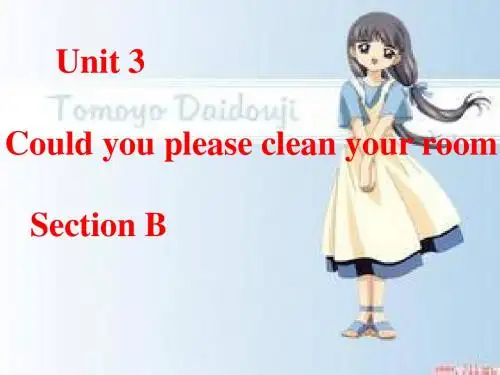
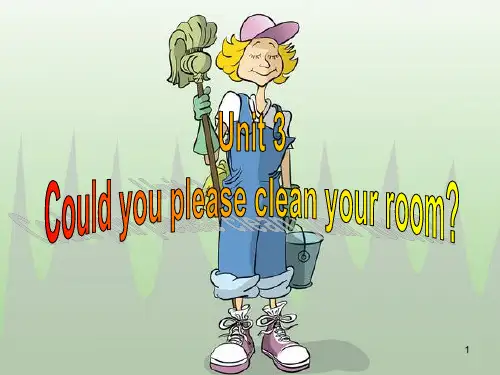
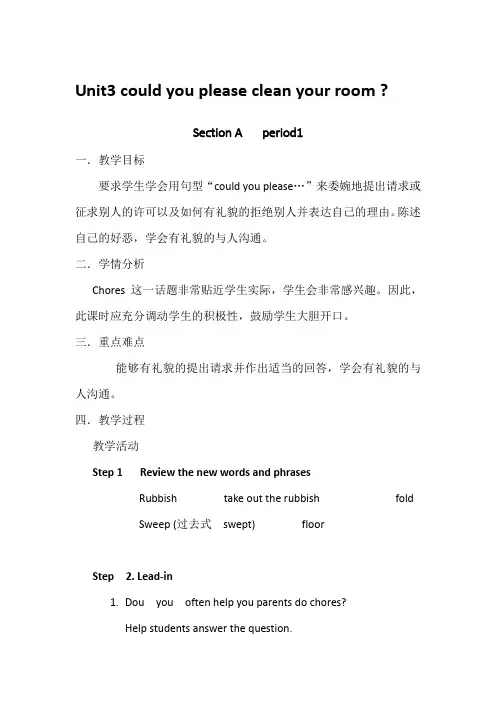
Unit3 could you please clean your room ?Section A period1一.教学目标要求学生学会用句型“could you please…”来委婉地提出请求或征求别人的许可以及如何有礼貌的拒绝别人并表达自己的理由。
陈述自己的好恶,学会有礼貌的与人沟通。
二.学情分析Chores 这一话题非常贴近学生实际,学生会非常感兴趣。
因此,此课时应充分调动学生的积极性,鼓励学生大胆开口。
三.重点难点能够有礼貌的提出请求并作出适当的回答,学会有礼貌的与人沟通。
四.教学过程教学活动Step 1 Review the new words and phrasesRubbish take out the rubbish foldSweep (过去式swept) floorStep 2. Lead-in1.Dou you often help you parents do chores?Help students answer the question.2.Do yoy do these chores at home?Help students answer thequestion.(do the dishes . clean the room……)3.Show more pictures on the screen about doing the chores. Letstudents quess what chore it is. (do the dishes, sweep thefloor, take out the rubbish, clean the living room……)Step 3. Presentation1.Look and say “could you pless sweep the floor?” Guide studentsunderstand and make mentences. Then guide them answer thequestion. And give more situations.2.Sudents work in pairs. Help them to make polite requests byusing target language “could you please﹢动词原形”and answers“sure/of course/OK/certainly……or Sorry, I can’t ”Step 4. Group work.Make up ditferent conversations by themsdoes about doing the chores.HomeworkRole-play conversation (2d)。
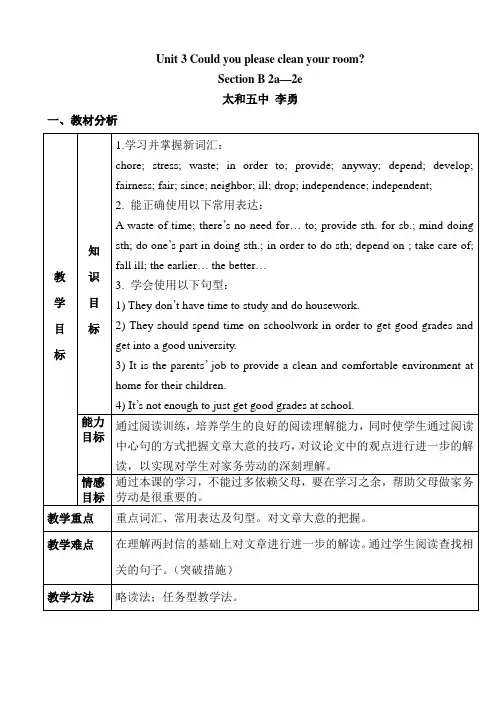
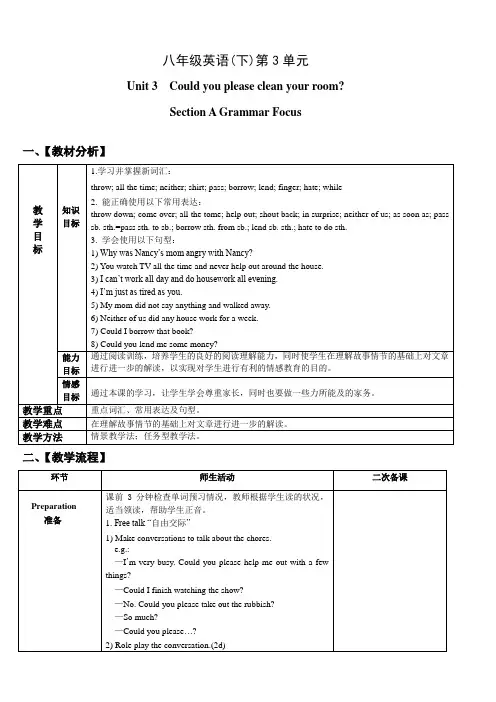
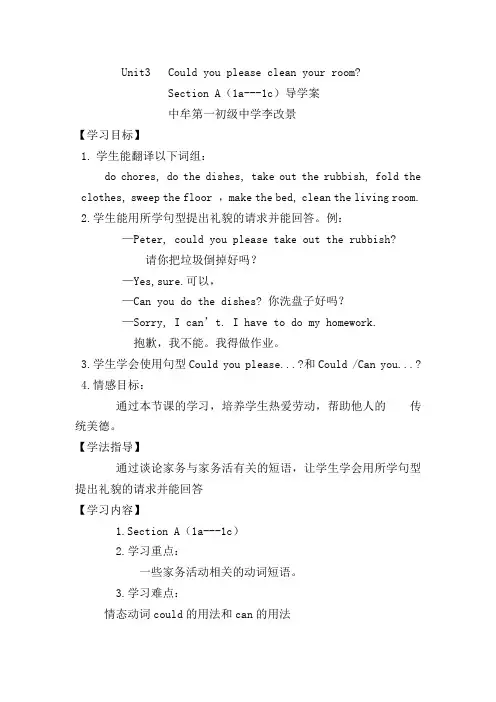
Unit3 Could you please clean your room?Section A(1a---1c)导学案中牟第一初级中学李改景【学习目标】1.学生能翻译以下词组:do chores, do the dishes, take out the rubbish, fold the clothes, sweep the floor ,make the bed, clean the living room.2.学生能用所学句型提出礼貌的请求并能回答。
例:—Peter, could you please take out the rubbish?请你把垃圾倒掉好吗?—Yes,sure.可以,—Can you do the dishes? 你洗盘子好吗?—Sorry, I can’t. I have to do my homework.抱歉,我不能。
我得做作业。
3.学生学会使用句型Could you please...?和Could /Can you...?4.情感目标:通过本节课的学习,培养学生热爱劳动,帮助他人的传统美德。
【学法指导】通过谈论家务与家务活有关的短语,让学生学会用所学句型提出礼貌的请求并能回答【学习内容】1.Section A(1a---1c)2.学习重点:一些家务活动相关的动词短语。
3.学习难点:情态动词could的用法和can的用法4.教学过程:Task1.自主学习,整体感知1.预习检测:试读单词,解决语音问题。
2. 查阅并翻译下面的短语动词1) 整理床铺_______________ 2)打扫起居室_______________3) 洗餐具 _______________ 4) 倒垃圾_______________5)扫地_______________ 6)做家务_______________Task2、合作交流,文本探究1.讨论课本P17图片,思考以下问题,Who are the two people in the picture?Why do you say so? Where are they?What housework is the mother asking Peter to do?然后结合幻灯片学习短语2.Guessing game:What chore is she/he doing?3.看课本1a, Ask:Do you do these chores at home? Write”Y”for “yes” or “N” for “no”.师生问答。
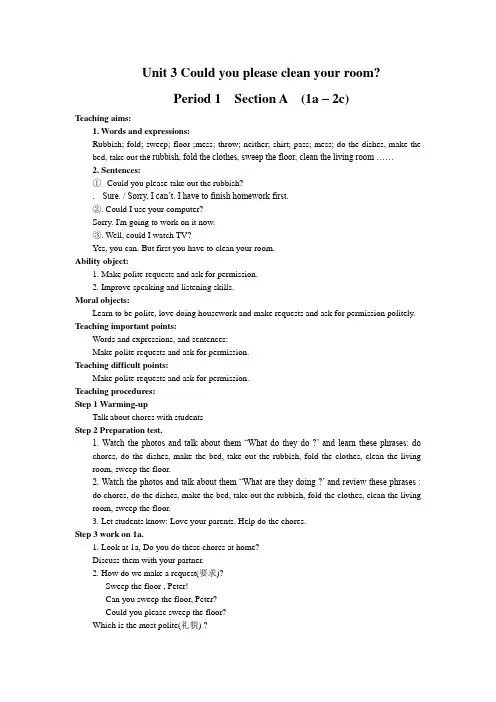
Unit 3 Could you please clean your room?Period 1 Section A (1a – 2c)Teaching aims:1. Words and expressions:Rubbish; fold; sweep; floor ;mess; throw; neither; shirt; pass; mess; do the dishes, make the bed, take out th e rubbish, fold the clothes, sweep the floor, clean the living room ……2. Sentences:①--Could you please take out the rubbish?. --Sure. / Sorry, I can’t. I have to finish homework first.②. Could I use your computer?Sorry. I'm going to work on it now.③. Well, could I watch TV?Yes, you can. But first you have to clean your room.Ability object:1. Make polite requests and ask for permission.2. Improve speaking and listening skills.Moral objects:Learn to be polite, love doing housework and make requests and ask for permission politely. Teaching important points:Words and expressions, and sentences:Make polite requests and ask for permission.Teaching difficult points:Make polite requests and ask for permission.Teaching procedures:Step 1 Warming-upTalk about chores with studentsStep 2 Preparation test.1. Watch the photos and talk about them “What do they do ?’ and learn these phrases: dochores, do the dishes, make the bed, take out the rubbish, fold the clothes, clean the living room, sweep the floor.2. Watch the photos and talk about them “What are they doing ?’ and review these phrases :do chores, do the dishes, make the bed, take out the rubbish, fold the clothes, clean the living room, sweep the floor.3. Let students know: Love your parents. Help do the chores.Step 3 work on 1a.1. Look at 1a, Do you do these chores at home?Discuss them with your partner.2. How do we make a request(要求)?Sweep the floor , Peter!Can you sweep the floor, Peter?Could you please sweep the floor?Which is the most polite(礼貌) ?3. Make polite requestsStep 4 Work on 1b.1. 1b Listen. Who will do these chores? Check (√) Peter’s mother or Peter.2. Check the answers.Step 5 Listening 2a&2b1.Peter asks his father if he can do four things. What does his father say? Check (√) “yes” or“no”. Listen again. Draw lines to the reasons.2. Check the answers .Step 6 Group work .Group work: Family drama(家庭短剧)One day, Tony’s sister w ants Tony to do some chores. Because their mother is coming and the house is in a mess.Example:Sister: Tony, could you please help out with a few thingsTony: …………….Step 7 summaryWords and expressions about choresSentences about making polite requests and asking for permission.Step 8 testBrain storm and make some multiple-choice question.Step 9 homework1. You want to go to your friend Jim’s birthday party, but you don’t know your parents’ idea. How could you ask them?Make a conversation about it.2. Finish Exercise Book SectionA (1A-2C)。
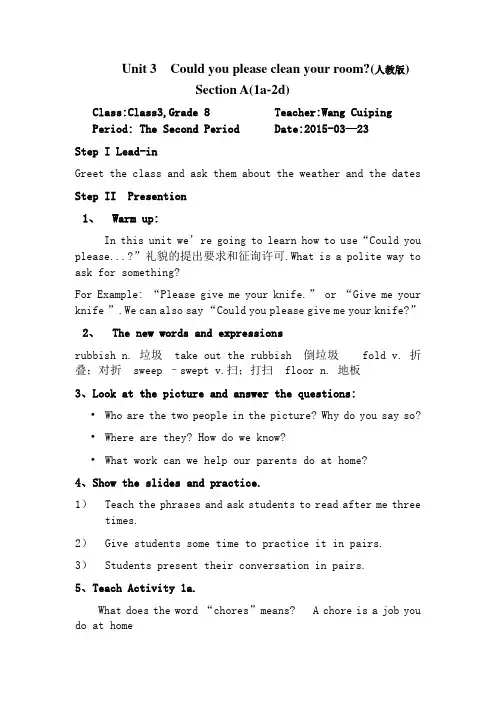
Unit 3 Could you please clean your room?(人教版)Section A(1a-2d)Class:Class3,Grade 8 Teacher:Wang CuipingPeriod: The Second Period Date:2015-03—23Step I Lead-inGreet the class and ask them about the weather and the datesStep II Presention1、Warm up:In this unit we’re going to learn how to use“Could you please...?”礼貌的提出要求和征询许可.What is a polite way to ask for something?For Example: “Please give me your knife.” or “Give me your knife ”.We can also say “Could you please give me your knife?”2、The new words and expressionsrubbish n. 垃圾 take out the rubbish 倒垃圾 fold v. 折叠;对折 sweep –swept v.扫;打扫 floor n. 地板3、Look at the picture and answer the questions:•Who are the two people in the picture? Why do you say so?•Where are they? How do we know?•What work can we help our parents do at home?4、Show the slides and practice.1)Teach the phrases and ask students to read after me three times.2)Give students some time to practice it in pairs.3)Students present their conversation in pairs.5、Teach Activity 1a.What does the word “chores”means? A chore is a job you do at home用以下字母在各项琐事旁边标注对方的答案,确保学生对所学内容的使用和交流:O=often; S=usually; ST=sometimes HE=hard ever; N=never1)Please work in pairs or in group of three.2)Two students write the name of each chore on the blackboard3)Please raise your hands if you do these chores when I readeach chore to you.4)Write the number of students who raise their hands after eachchore on the blackboard.6.Listening( Teach Activity 1b)1) Look at the picture and answer: “Will Peter take out the rubbish?”2) Look at 1b table and guess:“Who will do these chores,Peter or his mother?”3) Play the recording. Students complete the table individually4) Check the answers and compare the answers with your pre-listening guesses.7.Teach Activity 1c.Make conversations about thechores in 1a.1)Invite two students to read the model conversation aloud to the class.2)Work in pairs or in group of three to make conversations .Replace the chores mentioned in the conversation with any of the chores you learned today.3)Invite a few pairs to present their conversation to the class.4)Compare “Could you please do…?””Can you do…?”5)Summary and homework.。